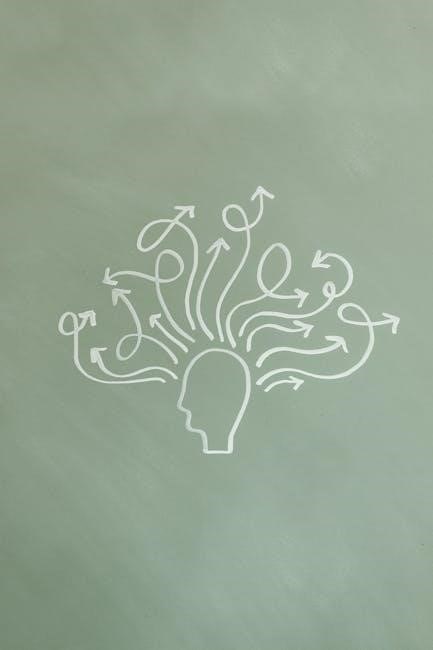fundamentals of abnormal psychology 10th edition pdf
This section introduces the core concepts of abnormal psychology, outlining its significance, key principles, and the importance of understanding mental health in a comprehensive manner.
Overview of the Book and Its Importance
Fundamentals of Abnormal Psychology, 10th Edition, by Ronald and Jonathan Comer, offers a comprehensive exploration of mental health, covering theories, diagnoses, and treatments. This edition integrates recent research, including the psychological impact of the COVID-19 pandemic, making it a valuable resource for students and professionals. Available in print and digital formats, it provides a clear, engaging framework for understanding mental disorders and their societal implications.
Key Features of the 10th Edition
The 10th edition of Fundamentals of Abnormal Psychology includes updated research on trauma, stress, and anxiety disorders, with a dedicated section on the psychological impact of the COVID-19 pandemic. It offers enhanced digital integration through Macmillan’s Achieve platform, providing interactive learning tools. The text emphasizes cross-cultural perspectives and modern treatment approaches, ensuring a well-rounded understanding of abnormal psychology for both students and practitioners.

Historical Context of Abnormal Psychology
Abnormal psychology has evolved from ancient beliefs in supernatural forces to modern evidence-based frameworks, reflecting societal and scientific advancements in understanding mental health disorders.
Evolution of Abnormal Psychology as a Field
Abnormal psychology has transitioned from supernatural explanations to scientific inquiry, integrating biological, psychological, and sociocultural perspectives. The 10th edition of Comer’s text highlights this evolution, emphasizing evidence-based practices and cultural influences. It underscores how historical beliefs, such as demonology, have been replaced by modern frameworks, reflecting advancements in research and clinical applications. This progression illustrates the field’s adaptability and commitment to understanding mental health through a multifaceted lens.
Key Theories and Models Through the Ages
Abnormal psychology has been shaped by diverse theories, from early psychoanalytic and behavioral models to modern cognitive-behavioral and biological approaches. The 10th edition of Comer’s text explores these frameworks, highlighting their contributions and limitations. It traces the shift from supernatural beliefs to empirical explanations, emphasizing how theories like psychodynamics, humanism, and biopsychosocial models have influenced understanding and treatment of mental disorders, reflecting the field’s ongoing quest for comprehensive and effective interventions.

Models of Abnormality
Abnormality is understood through biological, psychological, and sociocultural models, each offering unique insights into mental health issues, enabling a comprehensive approach to understanding human behavior and disorders.
Biological, Psychological, and Sociocultural Perspectives
The biological perspective explores brain chemistry and genetics, while the psychological focuses on mental processes like cognition and emotion. Sociocultural examines cultural influences and environmental factors. Together, these perspectives provide a holistic understanding of mental health, enabling effective diagnosis and treatment strategies.
Integration of Models in Modern Practice
Modern practice integrates biological, psychological, and sociocultural models to address mental health comprehensively. This approach combines biological treatments, psychological therapies, and environmental considerations, ensuring tailored interventions. It fosters a holistic understanding of mental disorders, enhancing diagnosis accuracy and treatment effectiveness. By merging these perspectives, professionals can address the complexity of mental health challenges more effectively, promoting better patient outcomes and overall well-being.

Clinical Assessment, Diagnosis, and Treatment
This section explores clinical assessment tools, diagnostic criteria, and evidence-based treatments, emphasizing their interplay in modern mental health care.
Methods of Assessment and Diagnostic Tools
The 10th edition details clinical assessment methods, including interviews, behavioral observations, and psychological tests. Diagnostic tools like the DSM-5-TR criteria are emphasized, ensuring accurate diagnoses. The text also covers neuropsychological assessments and cultural considerations in evaluation, providing a comprehensive approach to understanding mental health conditions and guiding effective treatment plans.
Modern Treatment Approaches and Their Effectiveness
The 10th edition highlights evidence-based treatments, including cognitive-behavioral therapy (CBT), medication, and psychosocial interventions. It emphasizes personalized approaches, integrating biological and psychological strategies. Emerging therapies like mindfulness-based interventions and digital mental health tools are also explored, providing insights into their efficacy and application in contemporary practice. The text underscores the importance of cultural sensitivity and adaptability in treatment, ensuring comprehensive care for diverse populations.
Anxiety, Obsessive-Compulsive, and Related Disorders
Explores anxiety disorders, obsessive-compulsive conditions, and related psychological challenges, highlighting symptoms, diagnostic criteria, and the impact on daily functioning and mental well-being.
Classification and Symptoms of Anxiety Disorders
Anxiety disorders are characterized by excessive fear, worry, or avoidance behaviors. Common types include generalized anxiety disorder, panic disorder, and social anxiety disorder. Symptoms often involve heightened arousal, restlessness, and impaired daily functioning. The DSM-5 provides standardized criteria for diagnosis, emphasizing persistent and debilitating symptoms. Understanding these classifications is crucial for accurate assessment and effective treatment, helping individuals manage their mental health challenges effectively.
Current Research and Treatment Options
Current research emphasizes the efficacy of cognitive-behavioral therapy (CBT) and exposure therapy for anxiety disorders. Pharmacological interventions, such as SSRIs, are also widely studied and applied. Recent advancements include personalized treatment plans and the integration of digital platforms for remote therapy. These innovations aim to enhance accessibility and effectiveness, aligning with modern mental health challenges and the evolving understanding of anxiety mechanisms, supported by ongoing clinical studies and real-world applications and research.
Disorders of Trauma and Stress
Explores post-traumatic stress disorder (PTSD), acute stress disorders, and the psychological impact of traumatic events, emphasizing the role of trauma in shaping mental health challenges and recovery processes.
Understanding PTSD and Acute Stress Disorders
Post-traumatic stress disorder (PTSD) and acute stress disorders stem from exposure to traumatic events, triggering intense fear or helplessness. PTSD involves persistent symptoms like flashbacks, hypervigilance, and avoidance behaviors, lasting over a month. Acute stress disorders mirror PTSD but resolve within a month. Both conditions highlight the profound psychological impact of trauma, requiring tailored interventions to address their debilitating effects and promote recovery, as detailed in the 10th edition.
The Role of Trauma in Psychological Disorders
Trauma plays a pivotal role in shaping psychological disorders, often leading to long-term emotional and psychological distress. It can manifest as anxiety, depression, or personality disorders, significantly impacting mental health. The 10th edition emphasizes how traumatic experiences alter cognitive and emotional processes, contributing to maladaptive behaviors and thought patterns. Understanding trauma’s role is crucial for developing effective interventions to address its profound effects on individuals and promote resilience and recovery.

Depressive and Bipolar Disorders
Depressive and bipolar disorders involve extreme mood swings, impacting emotional stability and daily functioning. These conditions vary in severity and require comprehensive diagnosis and treatment strategies.
Causes, Symptoms, and Diagnosis
Depressive disorders are characterized by persistent sadness, loss of interest, and emotional instability, while bipolar disorders involve extreme mood swings. Causes include genetic, biological, and environmental factors. Symptoms vary but often disrupt daily functioning. Diagnosis involves clinical assessments and criteria from the DSM-5, focusing on severity and duration of symptoms. Accurate diagnosis is crucial for effective treatment planning and management of these conditions.
Contemporary Treatment Strategies
Contemporary approaches for depressive and bipolar disorders emphasize evidence-based therapies like cognitive-behavioral therapy (CBT) and interpersonal therapy. Medications, such as antidepressants and mood stabilizers, are refined for efficacy and tolerability. Neuromodulation techniques, including transcranial magnetic stimulation (TMS) and electroconvulsive therapy (ECT), offer options for treatment-resistant cases. Lifestyle interventions, like regular exercise and mindfulness practices, complement traditional treatments, while emerging research explores innovative biological and psychological interventions to enhance recovery and quality of life for patients.
Suicide and Self-Destructive Behaviors
Suicide and self-destructive behaviors are examined through their complex interplay of psychological, social, and biological factors, emphasizing risk assessment and prevention strategies to address these critical issues.
Risk Factors and Prevention Strategies
Identifying risk factors such as mental health disorders, trauma, and social isolation is crucial in preventing suicide. Prevention strategies include early intervention, therapy, and community support systems to reduce vulnerability and promote resilience. These approaches aim to address underlying causes and provide individuals with coping mechanisms and access to mental health resources to mitigate self-destructive behaviors effectively.
The Impact of Mental Health Interventions
Mental health interventions significantly improve outcomes for individuals with psychological disorders. Evidence-based treatments like CBT reduce symptoms and enhance quality of life. Early interventions promote long-term recovery and resilience. Effective interventions also reduce healthcare costs and societal burdens, highlighting their importance in addressing mental health challenges comprehensively and sustainably.
Cultural and Cross-Cultural Perspectives
Cultural influences shape mental health perceptions, diagnosis, and treatment globally. Cross-cultural psychology examines diverse norms, values, and beliefs impacting abnormal behavior, enhancing understanding of mental health worldwide.
Cultural Influences on Abnormal Psychology
Cultural norms and values significantly influence perceptions of abnormal behavior, shaping symptoms, diagnosis, and treatment approaches. The 10th edition explores how diverse societies define mental health, emphasizing the importance of cultural sensitivity in assessment and intervention. It highlights how cultural differences impact the manifestation of psychological disorders, underscoring the need for culturally responsive care in modern clinical practice.
Global Mental Health Initiatives
Global mental health initiatives aim to address disparities in psychological care worldwide. The 10th edition highlights efforts to expand access to mental health services, particularly in low-resource settings. These initiatives emphasize training healthcare providers, reducing stigma, and implementing evidence-based treatments. Collaborative programs between nations and organizations are fostering a unified approach to improving mental health outcomes globally, ensuring equitable care for all individuals.
Recent Developments and Future Directions
The 10th edition explores emerging trends, including the impact of the COVID-19 pandemic on mental health and innovative research advancing psychological interventions and treatments.
The Impact of the COVID-19 Pandemic on Mental Health
The COVID-19 pandemic has significantly influenced mental health, increasing rates of anxiety, depression, and PTSD. Social isolation, economic stress, and fear of illness exacerbated psychological distress globally. The 10th edition highlights how the pandemic revealed vulnerabilities in mental health systems and accelerated the need for telehealth and innovative interventions to address these growing challenges and support long-term recovery and resilience.
Emerging Trends in Research and Practice
Recent advancements in abnormal psychology include the integration of digital mental health tools, AI-driven diagnostics, and personalized treatments. The 10th edition emphasizes telehealth expansion, mindfulness-based therapies, and the role of neurobiology in treatment. There is also a growing focus on cultural competence, early intervention, and prevention strategies. These trends reflect a shift toward holistic, evidence-based approaches, addressing mental health challenges with innovation and inclusivity.
Practical Applications and Resources
This section provides practical tools and resources, such as study guides and online materials, to aid students and professionals in applying psychological concepts effectively today.
How to Use the Book for Study and Reference
Students can maximize learning by setting study goals, taking notes, and using digital tools like quizzes and flashcards. The 10th edition offers interactive exercises and downloadable resources, such as PDFs and ePubs, to enhance understanding. Additionally, the Achieve platform provides personalized study plans and real-time progress tracking. These features make the book an invaluable resource for both classroom learning and independent study.
- Set clear study goals for each chapter.
- Engage with interactive exercises online.
- Utilize downloadable resources for review;
Additional Resources for Further Learning
Supplement your studies with online resources, including downloadable PDFs and ePubs of the 10th edition. Explore interactive tools, such as quizzes and flashcards, to reinforce key concepts. Additionally, access articles, research papers, and multimedia content available through the book’s companion website and platforms like Achieve, enhancing your understanding of abnormal psychology.
- Downloadable PDF and ePub formats.
- Interactive study tools like quizzes.
- Access to research articles and multimedia.